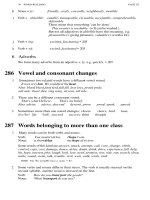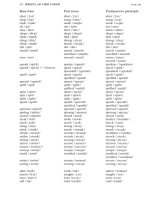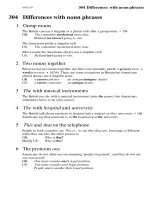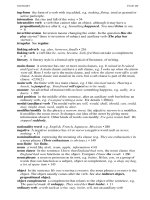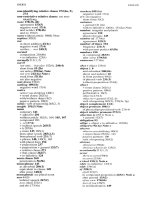Tài liệu Oxfore guide to english grammar part 58 docx
Bạn đang xem bản rút gọn của tài liệu. Xem và tải ngay bản đầy đủ của tài liệu tại đây (42.32 KB, 7 trang )
304 Differences with noun phrases
1 Group nouns
The British can use a singular or a plural verb after a group noun. • 156
GB: The committee needs/need more time.
Holland isn't/aren't going to win.
The Americans prefer a singular verb.
US: The committee needs/need more time.
After a name the Americans always use a singular verb.
US: Holland isn't going to win.
2 Two nouns together
When we use two nouns together, the first is not normally plural: a grocery store, a
word processor, • 147(4). There are some exceptions in Britain but Americans
almost always use a singular noun.
GB: a careers adviser an antique/antiques dealer
US: a career counselor an antique dealer
3 The with musical instruments
The British use the with a musical instrument (play the piano), but Americans
sometimes leave it out (play piano).
4 The with hospital and university
The British talk about a patient in hospital and a student at (the) university, • 168.
Americans say that someone is in the hospital or at the university.
5 This and that on the telephone
People in both countries say This is... to say who they are, but usage is different
when they ask who the other person is.
GB: Who is that?
Mainly US: Who is this?
6 The pronoun one
Americans do not often use one meaning 'people in general'; and they do not use
one's or oneself.
GB: One must consider one's legal position.
US: You must consider your legal position.
People must consider their legal position.
PAGE 393
304 Differences with noun phrases
40 AMERICAN ENGLISH PAGE 394
7 Numbers
The British use and between hundred and the rest of a number, but Americans can
leave it out.
GB/US: two hundred and fifty
US only: two hundred fifty
8 Dates
There are a number of different ways of saying and writing dates, • 195(2).
Americans often say July fourth. In Britain the fourth of July and July the fourth are
the most usual.
305 Differences with adjectives and adverbs
1 Well, ill etc
The adjectives well, fine, ill and unwell referring to health usually come in
predicative position. • 200(2)
GB/US: Our secretary is ill.
But they can be attributive, especially in America.
Mainly US: an ill man
NOTE
Sick and healthy can go in both positions. In Britain be sick means to vomit, to bring up food.
GB: Trevor's daughter was sick all over the carpet.
2 Adjectives and adverbs
In informal speech we can sometimes use an adjective form instead of an adverb.
Americans do this more than the British.
GB/US: That was really nice of her.
It certainly is raining.
Mainly US: That was real nice of her.
It sure is raining.
3 Somewhere and someplace
In informal American English everyplace, someplace and noplace can be used as
well as everywhere, somewhere and nowhere.
GB/US: Let's go out somewhere.
US only: Let's go out someplace.
306 Differences with prepositions
1 Out (of) and round/around
The British normally say look out of the window, although look out the window is
possible in informal speech. Americans prefer look out the window. The British say
either round the park or around the park. Americans prefer around the park.
307 Differences with conjunctions
2 Except for and aside from
Where the British use except for, Americans can also use aside from.
GB/US: I'm all right now, except for a headache.
US only: I'm all right now, aside from a headache.
3 Through and till/until
Americans can use through for the time when something finishes.
US: They will stay in New York (from January) through April.
GB/US: They will stay in London (from January) till/until April.
With through April, the time includes the whole of April. With until April they may
leave before the end of April. We can also express the meaning of through like this.
GB/US: They will stay in London until the end of April.
In British English we can also use inclusive. This is rather formal.
Mainly GB: Monday to Friday inclusive
US only: Monday through Friday
4 Idiomatic uses
GB US
in Oxford Street
at the weekend/at weekends
a player in the team
twenty (minutes) past ten
ten (minutes) to three
write to someone
visit someone
talk to someone
protest about/against something
on Fifth Avenue
on the weekend/on weekends
a player on the team
twenty (minutes) past/after ten
ten (minutes) to/of three
write someone/write to someone
visit someone/visit with someone
talk to/with someone
protest something
protest about/against something
5 Prepositions after different
GB: Your room is different from/to ours.
US: Your room is different from/than ours.
307 Differences with conjunctions
1 Go/Come and...
Americans can leave out and from this pattern.
GB/US: Go and take a look outside.
Mainly US: Go take a look outside.
PAGE 395
2 In case and lest
The British use in case meaning 'because something might happen', • 259(7).
Americans use so or lest. Lest is formal.
Mainly GB: Go quietly in case anyone hears you.
GB/US: Go quietly so no one can hear you.
Mainly US: Go quietly lest anyone hear you. (formal).
In America, in case often means 'if.
US: If you need/In case you need any help, let me know.
3 Immediately
Americans do not use immediately as a conjunction.
GB/US: As soon as I saw him, I recognized him.
GB only: Immediately I saw him, I recognized him.
308 American spelling
Some words end in our in Britain but in or in America: color, labor, neighbor.
Some words end in tre in Britain but in ter in America: center, liter.
Some verbs can end either with ize or with ise in Britain but only with ize in
America: apologize, organize, realize.
In Britain there is doubling of l in an unstressed syllable; • 293(3) Note. In some
American words there is no doubling: marvelous, signaled, councilor.
Here are some words with different spellings.
GB US GB US
analyse analyze labelled labeled
apologize/apologise apologize labour labor
axe axe/ax litre liter
behaviour behavior marvellous marvelous
catalogue catalog/catalogue metre (= 100 cm) meter
centre center neighbour neighbor
cheque (money) check organize/organise organize
colour color plough plow
councillor councilor practise (verb) practice (verb
counsellor counselor practice (noun) and noun)
defence defense/defence pyjamas pajamas
dialogue dialog/dialogue realize/realise realize
favour favor signalled signaled
grey gray/grey skilful skillful
honour honor theatre theater
humour humor through through
jail/gaol jail thru (informal)
jeweller jeweler travelling traveling
kerb (edge of curb tyre (on a wheel) tire
pavement)
40 AMERICAN ENGLISH PAGE 396
PAGE 397
Glossary
abstract noun See concrete noun.
action verb a verb that refers to something happening or changing, e.g. do, walk,
buy, speak • 62
active See passive.
active participle the ing-form of a verb used after be in the continuous (I was
watching) and in other patterns • 134
adding relative clause a clause with commas around it that adds extra
information, e.g. Bernard, who was feeling unwell, left early. • 274
adjective a word like big, new, special, famous • 197
adjective phrase An adjective phrase is either an adjective on its own, e.g. sweet,
tall, hopeful, or an adjective with an adverb of degree, e.g. very sweet, a lot taller,
quite hopeful.
adverb In the sentence The time passed slowly, the word slowly is an adverb.
Adverbs are words like easily, there, sometimes, quite, possibly. They express
ideas such as how, when or where something happens, or how true
something is.
adverb phrase An adverb phrase is either an adverb on its own, e.g. carefully,
often, probably, or an adverb which is modified by an adverb of degree, e.g. very
carefully, more often, quite probably.
adverbial The adverb late, the phrase in a hurry and the clause because I was cold
all function as adverbials in these sentences: The show started late. We did
everything in a hurry. I put a coat on because I was cold.
adverbial clause In the sentence I'll ring you when I get home, the clause when I
get home functions as an adverbial. Compare I'll ring you later. • 248
agent The agent is the person, animal or thing doing the action. In an active
sentence it is the subject: Max told me the news. In a passive sentence there is
sometimes an agent after by: I was told the news by Max.
agreement the choice of the correct verb form after a subject: My ear torts but My
ears hurt. •150
apostrophe In the phrase Karen's friend there is an apostrophe between Karen
and s.
apposition In the sentence The Chairman, Mr Byers, was absent, the two noun
phrases are in apposition. • 14
article A/an is the indefinite article, and the is the definite article.
aspect A verb can have continuous aspect (is walking, was looking) or perfect
aspect (has walked, had looked), or both (have been waiting).
attributive the position of an adjective before a noun, e.g. a cold day
auxiliary verb a verb such as be, have, do, will, can which we use with an ordinary
verb • 60 (2)
bare infinitive an infinitive without to, e.g. come, drive •115
base form the form of a verb without an ending, e.g. come, call, decide
classifying relative clause a relative clause that tells us what kind is meant, e.g. a
computer that will correct my spelling • 272 (3b)
clause The sentence We stayed at home is a single clause. The sentence We stayed
at home because it rained has two clauses. We stayed at home is the main clause,
